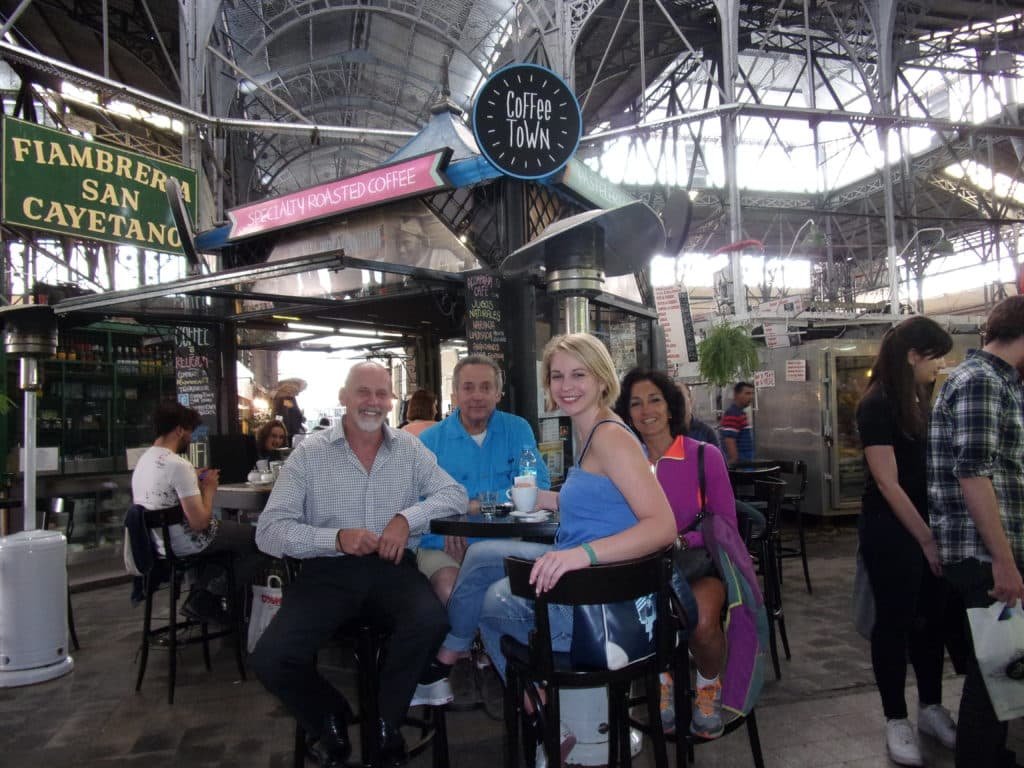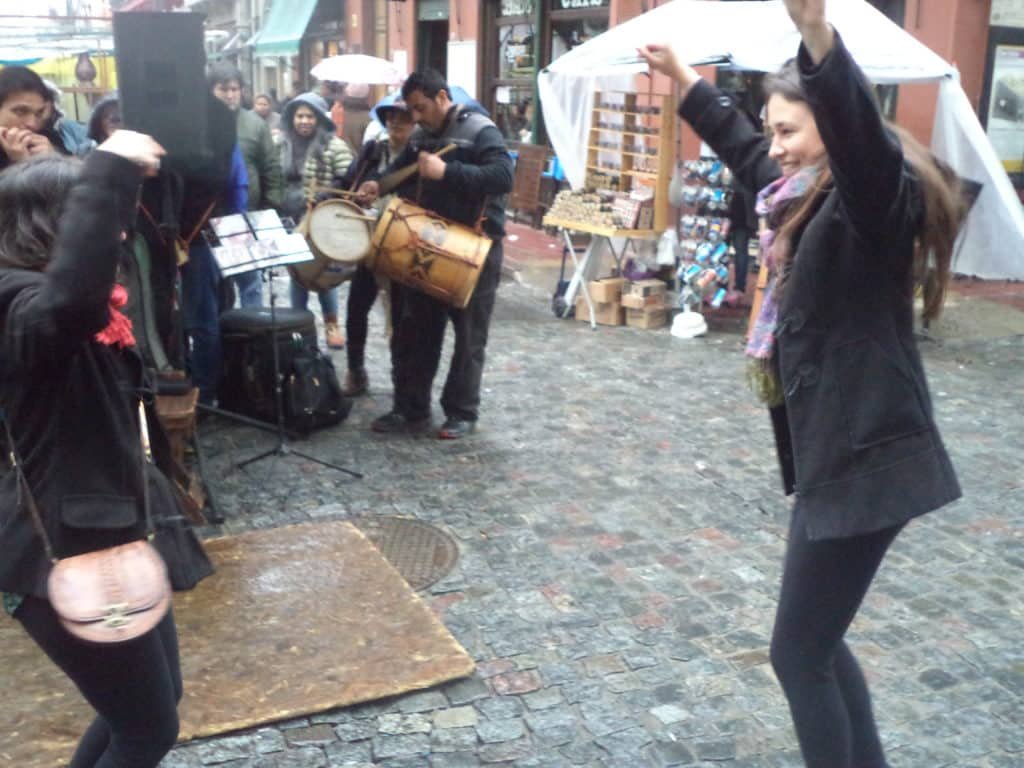
From left, Jose Hernandez (Argentinian pharmaceutical executive working in Baltimore); John Bechtel (author); Santana Subenbach (German backpacker in Buenos Aires), Hannah Ilva (Argentinian medical worker living in Boston) all of whom met by accident at the San Telmo Mercado on their way to other places.
There is an old Jewish joke about a Mrs. Berkowitz having a conversation with a friend. During the conversation the friend remarked at the beauty and breathtaking size of the diamond ring on Mrs. Berkowitz’s left hand. Mrs. Berkowitz phlegmatically responded that yes, it was the famous Berkowitz diamond but added after a brief pause, “but it comes with the infamous Berkowitz curse.” “And what is that?” her friend inquired. “Mr. Berkowitz” came the immediate reply.
It seems everyone wants to be a writer, and why not? It comes with a certain romantic cachet. You instantly become labeled as a wordsmith, a creative spirit, an intellectual, and it seems from that point on you can ask anything or do anything that engaged in by anyone else would be considered boorish or in poor taste, but excused in your case because “you’re a writer.” You may be forgiven for drinking to excess, talking too much or too loudly, dominating conversations, expressing political or social opinions too dogmatically, bragging too much, or dancing on tables, and you may be good-naturedly toasted or roasted. After all, you’re a writer.
Alas, writing also comes with a curse. You have to write, and it has to be something others want to read, and most unreasonably of all, it has to be something others are willing to pay to read. Short of that, you are a hobbyist.
A professional writer is also a marketer. It is not enough that your family and best friends extol your wit or intrinsic virtues as an undiscovered writer. It is your challenge to write, to get your talents recognized and compensated. This is what professional writers do.
And unless you aspire to being a starving artist, which has its own cachet of high anxiety, eating disorders, and toxic relationships, you as a writer will have to establish a reputation that causes editors to welcome your phone calls, queries, and manuscripts. This takes time, patience, delayed gratification, and of course, delayed payment for your services. Magazines typically pay upon publication, which can take up to a year, and sometimes they change their mind and offer no kill fee.
Becoming a successful, well compensated writer can best be described as pushing a very large boulder up a steep hill. If you misstep or lose your balance, both you and the boulder roll back down the hill closer to where you started. It is very hard work and is not for timid spirits. You are in fact building a business and it requires methodology, planning, good record keeping, and relentless self-marketing. To do more than merely survive requires self-discipline, something the artsy crowd is not particularly renowned for.
And then, of course, there’s the writing itself.
Full Disclosure
First, some full disclosure. I am a non-fiction writer. I have never attempted fiction, except in fifth grade when I wrote a class play. The opinions I am about to share with you are only one writer’s experiences. I have nothing to sell you, so I have no investment in persuading or discouraging you to pursue a writing career. This is going to be as straight-up as I can tell it, and you draw your own conclusions.
What are my qualifications? I do not have an MFA degree, and I have never made the NY Times bestseller list. After retiring from business, I attended a travel writer seminar by AWAI (American Writers and Artists International). The first article I wrote during that workshop was published several months thereafter, and I made a whopping $115.00 on it. Then followed a year of writing for bylines and testimonials, without a penny of payment from anyone. I was published about 25 times, thanks largely to a local newspaper that hired me to write restaurant reviews in North Dakota.
During that year and the next, I also wrote for regional magazines because I wanted more diversity in my bylines, and I wanted to write about more than restaurant menus. As a matter of fact I wasn’t convinced I wanted to be a travel writer at all, because over the years I had subscribed to a number of travel magazines and I found most of their content to be boring and I considered them vanity publications, meaning their highest and best use was adorning impressive coffee tables as an indirect way for subscribers to brag to their house guests about places they have been.
Bored by sunsets
But my personal appetite for endless iterations of glorious sunsets and sipping umbrella drinks on the beach was limited. I was far more interested in the people and cultures and histories of the 30-odd countries I had visited. In many cases I visited and stayed, or returned again and again, to really participate in the life experience of those who lived there. I strongly felt that there were two dimensions to every landscape; that of the tourist and another of those who lived in it. There was validity to both perspectives, but what looks romantic to the tourist often constitutes either hardship or boredom for the permanent resident.
I have always been curious about how other people lived, what they believed and hoped for, or despaired of, and why. I am endlessly curious and a natural-born interviewer. It helps that I am a good listener and open to other and very different experiences without passing judgment. As a result people have always been willing to open up to me, and I to them. When I travel I am a guest, and I always try to be a respectful and grateful one. I am never there to tell them anything, but to learn from them. I am not a missionary to evangelize or convert, and I do not brag, criticize, or represent anyone other than me. I am a citizen of the world, and I have yet to visit a foreign land where I was not welcomed sooner or later.
Never write for free without a good reason
One magazine editor gave me carte blanche about what I wanted to write about, as long as it fit within the themes of his magazine. After writing for free for a year for this magazine, I told them no more free stuff; if they wanted to keep me they would have to pay me. We settled for a dollar amount in four figures for each issue as a regular contributor. I have a strong sense of fiduciary responsibility to loyal editors and publishers to give their readers and advertisers the value they are looking for, which includes compelling content that keeps the pages turning and that teases their own curiosity about other peoples and places.
It’s all about the story.
It’s never about you, the writer. So forget about writing like a writer; don’t even start trying to impress anybody with anything about you. I repeat, it’s not about you. It’s about your story. So find a story. Get people talking and shut up and listen, and you will find stories everywhere. Be interested. You can’t fake this. Leave your Hemingway impersonation at home in the attic where it belongs and get real with people. If you don’t, they will see you as artificial and a phony and you will be very frustrated trying to find and develop your stories.
If you have a real story, there can be no such thing as writer’s block. Just tell the story. Forget fancy words and phrases and high-sounding vocabulary. Tell the story! At the risk of sounding unkind, get over yourself. If you lose yourself in your story, so will your readers, and they will love you for it.
Your story needs to have a beginning, a middle, and an end. Make sure they all sound like they belong to the same story. Start strong, grab your readers by their ankles and they will want to follow you. The ending is dessert and their reward, so make it worth the trip for them. What makes this place and these people you are writing about so interesting? If they aren’t that interesting, then you don’t have a story, so why are you trying to write about them? Don’t trick your readers into following you and then let them down.
Never bore your reader
If you have a story, something is happening; somebody is doing something purposeful, and your reader wants to know what they are up to and why. And it has to be something unique, unusual, odd, otherwise why would you be telling this story? When you try to turn a non-story into a story, you load up the narrative with adjectives and adverbs to disguise the fact that nothing is really happening here and you don’t have a story after all. At about this point the reader is disappointed and feeling a little betrayed by the writer. You promised and didn’t deliver. It is a mortal sin for a writer to bore his readers. It may take you a very long time to work your way out of writer purgatory.
Your style will find you
Fiction writers create stories that imitate life; non-fiction writers find real stories and tell them well. New writers can fill their heads with a great deal of confusing and distracting advice. I would forget about style; your style will find you. There is no need to go looking for it. Again, it’s not about you, the writer. It’s about your story. Get your reader into your story without excess verbiage and without wasting their time.
Do your homework
Lazy writers will be hungry writers. Magazines are businesses, and they would like to stay in business. They are not there to provide work for writers. They are there to satisfy readers, and advertisers want readers to buy from them. Read the ads in a few issues of the magazine you want to write for and the ads will tell you a lot about the readers of that magazine. Companies invest large sums of money compiling and studying reader demographics; study their ads and you as the writer benefit enormously, and for free, from their research! How bad can that be?
Study the layout of the magazines you want to write for, and identify the departments of the magazine and determine where your idea would fit best. Then study articles written previously for each of those departments for content and style. Think READER. That’s what your editors and advertisers are thinking about, and so must you, the writer. What is the distinction between this magazine and another that seems slightly similar? Sniff out the targeted readers as specifically as possible and then pitch your story to appeal to those same readers. If you have a good story that fits the publications targeted readership, your chances of being accepted for publication are greatly enhanced. Get on the same wavelength as your editor!
The curse of being a writer
Do I think an aspiring writer can earn $100,000 a year, whether as a traveler or otherwise? Absolutely. The life of a writer has huge benefits. But there’s a curse that goes with it. First, you have to work hard to become a good writer. It’s a craft and a skill set, and a degree in English or an MFA degree is no guarantee of anything. Can you get published as a mediocre writer? Yes, absolutely. I see mediocre writing all the time in publications. Can you rise to the top of the profession as a mediocre writer? Probably not. How good do you really want to be?
Then you have to master marketing your writing skills. The field is crowded with wannabes and competition is intense. You will have to work harder than others are willing to if you wish to rise above the field. It is not enough to want to write. What do you want to write about, and why? Find your passion (before the money) or you will give up before getting the boulder to the top of the hill. Persevere and in time you will reach a tipping point where you pick up momentum. Only then should you quit your day job. You will have paid the price. You are becoming a successful, professional writer. Now work at becoming a better one.


John,
Every story that you write is a little better than the last one. You are indeed a citizen of the world who has tasted life in more destinations than anyone else that I know.
This article on writing was very interesting to me because I dabble a little with writing and storytelling. Your points and suggestions of what a writer should and should not do was taken to heart. In life we like to put bubbles around our lifes to keep us safe and to guard our privacy. Your gift as a writter is you see those bubbles and through you skills have motivated people to allow and at the same time enjoy their bubble violations so that you can write about their lives and tell their stories.
The nice part about being inside a bubble is there is no beginning and no end, so there are fewer decisions to be made, such as when or where to begin or how do we know when its over. We can be transported in our dream-like insular bubble; no action is required. Until it pops; there’s often a startling noise, but then there’s nothing and no one remembers the dream. The bubble disappears as if it never existed. Safety is our favorite bubble/dream.